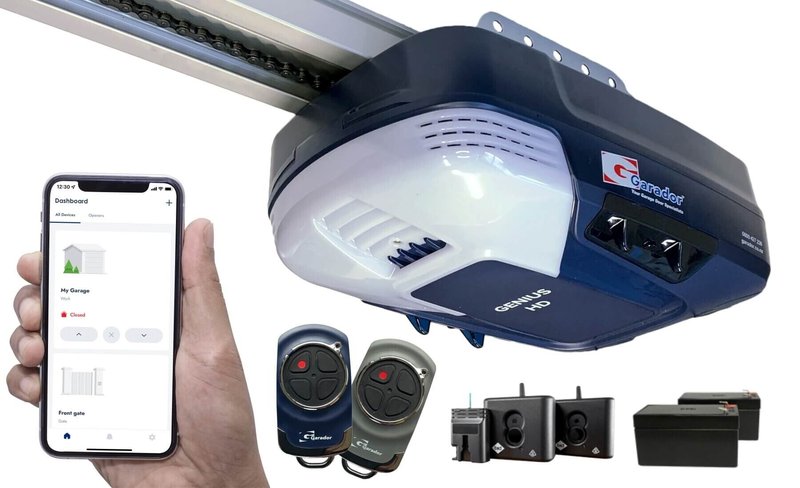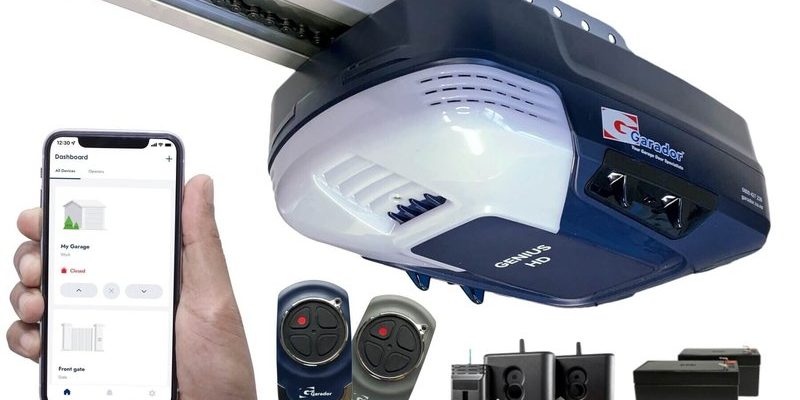
So, let’s dive into this topic headfirst. Whether you’re considering a new opener or just curious about how it all works, understanding the light wattage can help you choose the right system for your home. Get ready to compare some popular models, from brands like Chamberlain to LiftMaster, so you can make a well-informed decision.
What is Light Wattage in Garage Door Openers?
Before we jump into comparisons, let’s break down what light wattage actually means in the context of garage door openers. Essentially, wattage refers to the amount of electricity used by the light bulb in your opener. The higher the wattage, the brighter the light. If you think of it as a car’s horsepower, wattage gives you an idea of how powerful the light is.
Most garage door openers come with built-in lights that activate when you open or close your door. These range anywhere from low-wattage bulbs of about 5 watts to more robust options that can go up to 60 watts. The choice you make can impact visibility in your garage and surrounding areas, making it easier for you to navigate safely.
Not only does wattage affect brightness, but it also influences energy consumption. Lower wattage means less electricity usage, which can lead to lower energy bills. However, this can sometimes be a trade-off with visibility. Here’s where understanding your specific needs becomes crucial.
Why Wattage Matters for Safety and Convenience
Let’s talk about why having the right light wattage for your garage door opener is more than just a preference—it’s a matter of safety and convenience. When it’s dark outside, a well-lit garage can help you see hazards, tools, or pets that might be lurking in the shadows. If you’re fumbling with keys or packages at night, that extra brightness can make all the difference.
Moreover, if you often use your garage for hobbies or projects, having sufficient lighting helps tremendously. Imagine setting up a workspace in your garage, only to find that it’s too dim to see the details. A higher wattage bulb can mitigate that issue, creating a welcoming environment for any DIY project.
Different Wattages and Their Applications
When it comes to specific wattages available in garage door openers, here’s what you typically find:
- 5–10 Watts: These are usually found in basic garage door openers and are suitable for small spaces or minimal use. While you won’t get much brightness, they do save energy.
- 20–40 Watts: This range is perfect for everyday use. It provides enough light to see clearly when entering or exiting your garage, making it a great middle-ground option.
- 60 Watts and Above: High-wattage bulbs are ideal for those who use their garages frequently or for various activities. This brightness ensures you can see everything well, reducing risks and increasing comfort.
As you might be wondering, the right wattage for you depends on how you use your garage. If it’s mainly for parking your car, a lower wattage might suffice. But if you’re working on projects or need to see clearly, opting for a higher wattage makes sense.
A Brightness Comparison Table
Now that we’re familiar with the wattages, let’s compare some popular garage door openers across various wattages so you can see how they stack up.
| Model | Wattage | Brightness Level | Use Case |
|---|---|---|---|
| Chamberlain B970 | 100 Watts | High | Ideal for daily use and projects |
| LiftMaster 8500 | 40 Watts | Medium | Great for parking and light use |
| Genie QuietLift 800 | 10 Watts | Low | Good for occasional use |
Each model presents a different brightness that caters to unique needs. Now you can see that not all openers are created equal when it comes to light output.
Comparing LED vs. Incandescent Bulbs
You might be wondering whether to go for LED bulbs or stick with traditional incandescent options in your garage door opener. Here’s the scoop: LED bulbs generally use less energy and last significantly longer than their incandescent counterparts, making them a more cost-effective choice over time.
– Brightness: LEDs usually provide more light for lower wattage. You could have a 60-watt LED bulb giving off the same brightness as a 100-watt incandescent bulb.
– Lifespan: While an incandescent bulb might last around 1,000 hours, an LED can last up to 25,000 hours. That’s less hassle and fewer replacements.
– Heat Output: LEDs produce less heat, minimizing risks of overheating, especially in enclosed spaces.
If you’re selecting a new opener, consider opting for one that’s compatible with LED lighting. After all, who wants to be changing bulbs constantly?
Common Issues with Garage Door Opener Lighting
Let’s delve into some common problems you might face relating to the lighting of your garage door opener. One of the biggest annoyances is flickering lights. This issue often arises from loose connections or faulty wiring.
Changing bulbs frequently is another issue that frustrates many homeowners. It can be time-consuming and inconvenient. Using a brighter bulb might help, but if it’s burning out too quickly, check if you’re exceeding the intended wattage or if there’s a deeper electrical issue.
If your light doesn’t come on at all, look at the light socket and the bulb itself. Make sure the bulb is seated properly and that the socket isn’t damaged. Remember, safety first—if you’re unsure about any electrical work, it’s best to call a professional.
Choosing the Right Wattage for Your Needs
Here’s the thing—choosing the right wattage for your opener isn’t just a numbers game. It’s about finding the balance between brightness, safety, and efficiency. Ask yourself a few questions:
– What do I mostly use my garage for—just parking, or am I doing projects too?
– How often do I use my garage at night?
– Would I benefit from a brighter space?
Depending on your answers, you’ll have a clearer idea of whether you need low, medium, or high wattage light. Personal preference plays a significant role too, so don’t hesitate to experiment a bit.
Final Thoughts on Light Wattage in Garage Door Openers
In summary, understanding how light wattage affects your garage door opener can lead to smarter choices and a safer environment. From safety considerations to personal habits, every detail plays a role in your selection process.
Whether you’re opting for higher wattage for brighter lighting or sticking with a more energy-efficient model, there’s something for every need. So next time you’re in the market for a new opener or considering a replacement bulb, keep these insights in mind. A little brightness can lead to a lot of convenience—and that’s something worth investing in!
Happy garage exploring, and may your path always be well-lit!
